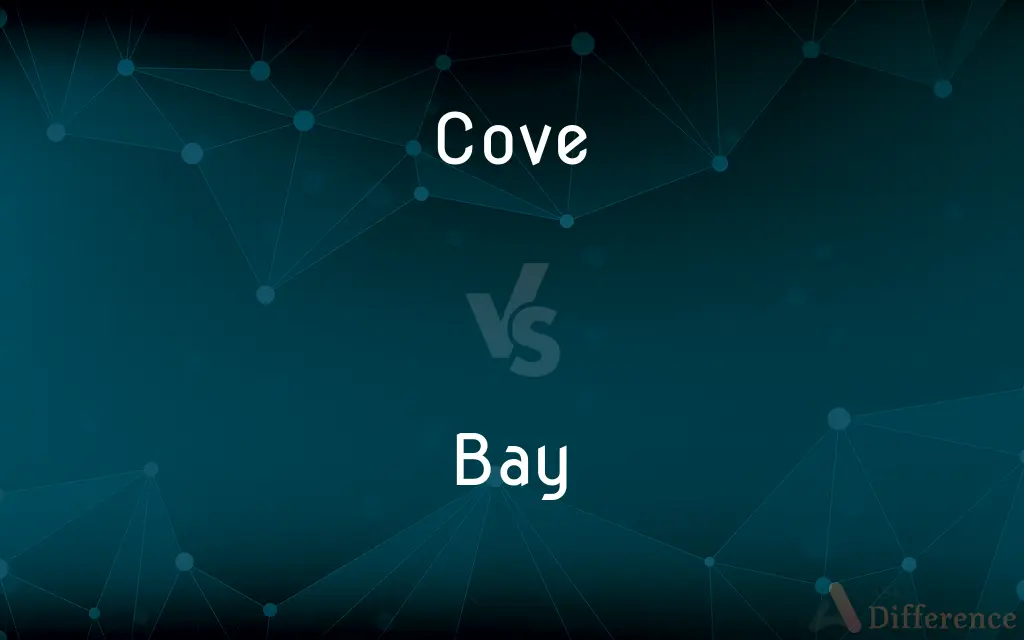Cove vs. Bay — What's the Difference?
By Maham Liaqat & Fiza Rafique — Updated on March 26, 2024
A cove is a small, sheltered inlet or bay with narrow entrance, while a bay is a larger, more open inlet of the sea or ocean.

Difference Between Cove and Bay
Table of Contents
ADVERTISEMENT
Key Differences
A cove is characterized by its small size and sheltered nature, often surrounded by land on three sides, providing a natural shelter from storms and waves. These features make coves ideal for anchorage and leisure activities such as swimming and kayaking. On the other hand, a bay is a broad inlet of the sea where the land curves inward, usually larger than a cove and can have a wider opening to the sea. Bays are significant for maritime activities, including shipping and fishing, due to their size and accessibility.
Coves, being smaller, tend to have a more intimate and secluded atmosphere, making them popular destinations for those seeking tranquility and a close connection with nature. Whereas bays, with their expansive waters, often host bustling communities and cities along their shores, benefiting from the ease of access to maritime routes and resources.
The formation of a cove is typically the result of differential erosion, where softer rock erodes away faster than the surrounding harder rock, creating a small, sheltered area. In contrast, bays can form through various geological processes, including the flooding of river valleys, glacier activity, and the movement of tectonic plates, leading to a wider variety of shapes and sizes.
Coves often serve as havens for diverse marine ecosystems, their sheltered waters supporting unique habitats for a variety of marine life. Bays, while also rich in marine biodiversity, tend to have a different ecological profile due to their larger size and the greater influence of ocean currents, which can bring in nutrients and marine species from the open sea.
Despite their differences, both coves and bays play vital roles in the natural world and human society. They provide protection from the harsh marine environment, support rich ecosystems, and have been pivotal in the development of maritime communities throughout history.
ADVERTISEMENT
Comparison Chart
Size
Small and intimate
Larger and more expansive
Shelter
Offers more shelter and protection
Less sheltered than coves
Formation
Often formed by differential erosion
Can form through various geological processes
Usage
Popular for leisure activities
Significant for shipping and fishing
Ecological Impact
Supports unique, sheltered ecosystems
Hosts diverse marine life with wider ecological variance
Compare with Definitions
Cove
A tranquil destination for relaxation and nature activities.
They enjoyed a peaceful kayak outing in the serene cove.
Bay
A broad inlet of the sea where the land curves inward.
The city overlooks a beautiful, expansive bay.
Cove
Characterized by its small size and narrow entrance.
The cove was ideal for snorkeling due to its calm waters.
Bay
Larger than a cove, with a wider opening to the sea.
Ships enter the harbor through the wide bay.
Cove
Provides natural protection against storms.
Fishermen use the cove as a safe haven during bad weather.
Bay
Can host communities and cities along its shores.
The bay area is known for its vibrant culture and history.
Cove
A small, sheltered inlet or part of a coast.
The boat anchored in a quiet cove for the night.
Bay
Vital for maritime activities, including shipping and fishing.
The bay's waters teem with fish, attracting fishermen from across the region.
Cove
Often surrounded by hills or cliffs.
They picnicked in a secluded cove, hidden from the wind.
Bay
Supports diverse marine ecosystems.
The bay is a biodiversity hotspot, home to numerous species of marine life.
Cove
A cove is a small type of bay or coastal inlet. Coves usually have narrow, restricted entrances, are often circular or oval, and are often situated within a larger bay.
Bay
A bay is a recessed, coastal body of water that directly connects to a larger main body of water, such as an ocean, a lake, or even another bay. A large bay is usually called a gulf, sea, sound, or bight.
Cove
A small sheltered bay in the shoreline of a sea, river, or lake.
Bay
A body of water partially enclosed by land but with a wide mouth, affording access to the sea
The Bay of Biscay.
Cove
A recess or small valley in the side of a mountain.
Bay
An area of land, such as an arm of prairie partially enclosed by woodland, that resembles in shape or formation a partially enclosed body of water.
Cove
A cave or cavern.
Bay
(Architecture) A part of a building marked off by vertical elements, such as columns or pilasters
An arcade divided into ten bays.
Cove
A narrow gap or pass between hills or woods.
Bay
A bay window.
Cove
A concave molding.
Bay
An opening or recess in a wall.
Cove
A concave surface forming a junction between a ceiling and a wall. Also called coving.
Bay
A section or compartment, as in a service station, barn, or aircraft, that is set off for a specific purpose
A cargo bay.
An engine bay.
Cove
A fellow; a man.
Bay
A sickbay.
Cove
To make in an inward curving form.
Bay
(Computers) A drive bay.
Cove
A hollow in a rock; a cave or cavern.
Bay
A reddish brown.
Cove
(architecture) A concave vault or archway, especially the arch of a ceiling.
Bay
A reddish-brown animal, especially a horse having a black mane and tail.
Cove
A small coastal inlet, especially one having high cliffs protecting vessels from prevailing winds.
Bay
A deep, prolonged bark, such as the sound made by hounds.
Cove
(US) A strip of prairie extending into woodland.
Bay
The position of one cornered by pursuers and forced to turn and fight at close quarters
The hunters brought their quarry to bay.
Cove
A recess or sheltered area on the slopes of a mountain.
Bay
The position of having been checked or held at a distance
"He has seen the nuclear threat held at bay for 40 years" (Earl W. Foell).
Cove
(nautical) The wooden roof of the stern gallery of an old sailing warship.
Bay
See laurel.
Cove
(nautical) A thin line, sometimes gilded, along a yacht's strake below deck level.
Bay
Any of certain other trees or shrubs with aromatic foliage, such as the California laurel.
Cove
A fellow; a man.
Bay
A crown or wreath made especially of the leaves and branches of the laurel and given as a sign of honor or victory.
Cove
A friend; a mate.
Bay
Often bays Honor; renown.
Cove
(architecture) To arch over; to build in a hollow concave form; to make in the form of a cove.
Bay
Reddish-brown
A bay colt.
Cove
To brood, cover, or sit over, as birds their eggs.
Bay
To utter a deep, prolonged bark.
Cove
A retired nook; especially, a small, sheltered inlet, creek, or bay; a recess in the shore.
Vessels which were in readiness for him within secret coves and nooks.
Bay
To pursue or challenge with barking
"I had rather be a dog, and bay the moon" (Shakespeare).
Cove
A strip of prairie extending into woodland; also, a recess in the side of a mountain.
Bay
To express by barking or howling
A mob baying its fury.
Cove
A concave molding.
Bay
To bring to bay
"too big for the dogs which tried to bay it" (William Faulkner).
Cove
A boy or man of any age or station.
There's a gentry cove here.
Now, look to it, coves, that all the beef and drinkBe not filched from us.
Bay
(obsolete) A berry.
Cove
To arch over; to build in a hollow concave form; to make in the form of a cove.
The mosques and other buildings of the Arabians are rounded into domes and coved roofs.
Bay
, a tree or shrub of the family Lauraceae, having dark green leaves and berries.
Cove
To brood, cover, over, or sit over, as birds their eggs.
Not being able to cove or sit upon them [eggs], she [the female tortoise] bestoweth them in the gravel.
Bay
Bay leaf, the leaf of this or certain other species of tree or shrub, used as a herb.
Cove
A small inlet
Bay
The leaves of this shrub, woven into a garland used to reward a champion or victor; hence, fame, victory.
Cove
Small or narrow cave in the side of a cliff or mountain
Bay
A tract covered with bay trees.
Bay
A kind of mahogany obtained from Campeche in Mexico.
Bay
(geography) A body of water (especially the sea) more-or-less three-quarters surrounded by land.
Bay
A bank or dam to keep back water.
Bay
An opening in a wall, especially between two columns.
Bay
An internal recess; a compartment or area surrounded on three sides.
Bay
The distance between two supports in a vault or building with a pitched roof.
Bay
(nautical) Each of the spaces, port and starboard, between decks, forward of the bitts, in sailing warships.
Bay
(rail transport) A bay platform.
Bay
A bay window.
Bay
The excited howling of dogs when hunting or being attacked.
Bay
(by extension) The climactic confrontation between hunting-dogs and their prey.
Bay
(figuratively) A state of being obliged to face an antagonist or a difficulty, when escape has become impossible.
Bay
A brown colour/color of the coat of some horses.
Bay
A horse of this color.
Bay
(intransitive) To howl.
Bay
(transitive) To bark at; hence, to follow with barking; to bring or drive to bay.
To bay the bear
Bay
(transitive) To pursue noisily, like a pack of hounds.
Bay
Of a reddish-brown colour (especially of horses).
Bay
Reddish brown; of the color of a chestnut; - applied to the color of horses.
Bay
An inlet of the sea, usually smaller than a gulf, but of the same general character.
Bay
A small body of water set off from the main body; as a compartment containing water for a wheel; the portion of a canal just outside of the gates of a lock, etc.
Bay
A recess or indentation shaped like a bay.
Bay
A principal compartment of the walls, roof, or other part of a building, or of the whole building, as marked off by the buttresses, vaulting, mullions of a window, etc.; one of the main divisions of any structure, as the part of a bridge between two piers.
Bay
A compartment in a barn, for depositing hay, or grain in the stalks.
Bay
A kind of mahogany obtained from Campeachy Bay.
Bay
A berry, particularly of the laurel.
Bay
The laurel tree (Laurus nobilis). Hence, in the plural, an honorary garland or crown bestowed as a prize for victory or excellence, anciently made or consisting of branches of the laurel.
The patriot's honors and the poet's bays.
Bay
A tract covered with bay trees.
Bay
Deep-toned, prolonged barking.
Bay
A state of being obliged to face an antagonist or a difficulty, when escape has become impossible.
Embolden'd by despair, he stood at bay.
The most terrible evils are just kept at bay by incessant efforts.
Bay
A bank or dam to keep back water.
Bay
To bark, as a dog with a deep voice does, at his game.
The hounds at nearer distance hoarsely bayed.
Bay
To bark at; hence, to follow with barking; to bring or drive to bay; as, to bay the bear.
Bay
To bathe.
Bay
To dam, as water; - with up or back.
Bay
An indentation of a shoreline larger than a cove but smaller than a gulf
Bay
The sound of a hound on the scent
Bay
Small Mediterranean evergreen tree with small blackish berries and glossy aromatic leaves used for flavoring in cooking; also used by ancient Greeks to crown victors
Bay
A compartment on a ship between decks; often used as a hospital;
They put him in the sick bay
Bay
A compartment in an aircraft used for some specific purpose;
He opened the bomb bay
Bay
A small recess opening off a larger room
Bay
A horse of a moderate reddish-brown color
Bay
Utter in deep prolonged tones
Bay
Bark with prolonged noises, of dogs
Bay
(used of animals especially a horse) of a moderate reddish-brown color
Common Curiosities
Can both coves and bays be used for maritime activities?
Yes, but bays are more significant for activities like shipping due to their size, whereas coves are better suited for leisure activities.
Can cities be located near coves?
While cities are more commonly located near bays due to the larger area and access to maritime routes, small communities can be found near coves.
How are coves formed?
Coves are typically formed by differential erosion, where softer rock wears away faster than surrounding harder rock.
Are bays important for ecosystems?
Yes, bays support diverse marine ecosystems and are important for the ecological balance in coastal areas.
Are bays always connected to the ocean?
Bays are generally connected to the ocean or a large body of water, though the size of the opening can vary.
What is the main difference between a cove and a bay?
The main difference lies in their size and openness; coves are small and sheltered, while bays are larger and more open.
Is a cove always smaller than a bay?
Yes, by definition, coves are smaller and more sheltered than bays.
Can the formation of a bay impact its surrounding geography?
Yes, the formation and evolution of a bay can significantly impact the coastal geography and local climate.
Why are bays important for cities?
Bays provide natural harbors and access to maritime trade routes, crucial for the economic development of coastal cities.
Do coves provide good shelter for boats?
Yes, coves are ideal for anchorage due to their sheltered nature.
Can a bay have multiple coves within it?
Yes, a larger bay can encompass several smaller coves along its shoreline.
How do human activities impact coves and bays?
Human activities, including pollution and development, can impact the natural state of coves and bays, affecting their ecosystems and usability.
Are coves found in specific parts of the world?
Coves can be found in various coastal regions around the world, especially in areas with soft rock formations.
What activities are best suited for a cove?
Activities like swimming, kayaking, and snorkeling are ideal for the calm and sheltered waters of a cove.
How does the ecological diversity compare between coves and bays?
While both can support rich ecosystems, bays typically have a broader ecological diversity due to their larger size and interaction with ocean currents.
Share Your Discovery

Previous Comparison
Choleric vs. Irascible
Next Comparison
Folder vs. FoulderAuthor Spotlight
Written by
Maham LiaqatCo-written by
Fiza RafiqueFiza Rafique is a skilled content writer at AskDifference.com, where she meticulously refines and enhances written pieces. Drawing from her vast editorial expertise, Fiza ensures clarity, accuracy, and precision in every article. Passionate about language, she continually seeks to elevate the quality of content for readers worldwide.















































